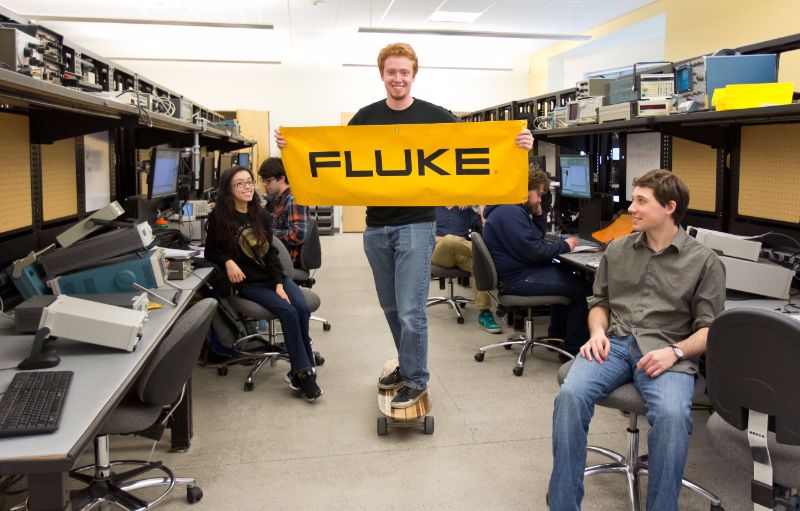Sample Minor Plans
Curious about how to navigate the curriculum to create the best Innovation Studies minor for you? Browse through the following curriculum plans to see how Innovation Studies might fit with your major and other requirements. With numerous courses available, the Innovation Studies minor is very flexible. You’ll also find that innovation courses double-dip with requirements in Art, Business, Communications, Economics, History, and other disciplines.
To get help creating a customized plan for you, email Michael Halvorson (halvormj@plu.edu). Use the following plans as a starting point.

- Art & Design Major / Innovation Studies Minor
- Business Major / Innovation Studies Minor
- Communication Major / Innovation Studies Minor
- Computer Science Major / Innovation Studies Minor
- Economics Major / Innovation Studies Minor
- English Major / Innovation Studies Minor
- History Major / Innovation Studies Minor
- Philosophy Major / Innovation Studies Minor
- Political Science Major / Innovation Studies Minor
- Psychology Major / Innovation Studies Minor
A PLU Art & Design major could complete his or her Innovation Studies minor with the following courses, maximizing “double-dip” credits (8 accepted Art & Design credits in the minor). Either AR, SO, or PH credits can also be selected in the Introduction to Innovation Studies course, to further meet University General Education requirements. Remember that this is just a sample—you can organize the required courses in many ways!
1) Introduction to Innovation Studies
Four Semester Hours
- HIST 121: History in Video Games or HIST 248 – Innovation, Ethics, and Society (S0)
2) Innovation Principles
Eight Semester Hours
Business principles (4 credits from the following):
- BUSA 201: Introduction to Business in a Global Environment
Design and Communication principles (4 credits from the following):
- ARTD 110: Graphic Design 1
3) Elective
Four Semester Hours
- ARTD 310: Graphic Design 3
4) Innovation Seminar
Four Semester Hours
- INOV 350 — Innovation Seminar
A PLU Business major could complete his or her Innovation Studies minor with the following courses, maximizing “double-dip” credits (8 accepted Business courses in the minor). Either SO or PH credits can be selected in the Introduction to Innovation Studies course, to further meet University General Education requirements. Alternatively, take BUSA 201 and ECON 101 as Principles courses, and then an elective from another department (such as Hist 247: Business and Economic History or CSCI 144: Introduction to Computer Science). Remember that this is just a sample—you can organize the required courses in many ways!
1) Introduction to Innovation Studies
Four Semester Hours
- HIST 248 – Innovation, Ethics, and Society (S0), PHIL 248 – Innovation, Ethics, and Society (PH), or HIST 346 – History of Innovation and Technology (SO)
2) Innovation Principles
Eight Semester Hours
Business principles (4 credits from the following):
- BUSA 201: Introduction to Business in a Global Environment/li
Design and Communication principles (4 credits from the following):
- COMA 215: Writing in Communication Careers
3) Elective
Four Semester Hours
- BUSA 358: Entrepreneurship- Intensive study of issues and challenges associated with start-up, growth, and maturation of a new enterprise.
4) Innovation Seminar
Four Semester Hours
- INOV 350 — Innovation Seminar
A PLU Communication major could complete his or her Innovation Studies minor with the following courses, maximizing “double-dip” credits (8 accepted Communication credits in the minor). Either SO or PH credits can also be selected in the Introduction to Innovation Studies course, to further meet University General Education requirements. Remember that this is just a sample—you can organize the required courses in many ways!
1) Introduction to Innovation Studies
Four Semester Hours
- HIST 248 – Innovation, Ethics, and Society (S0), PHIL 248 – Innovation, Ethics, and Society (PH), or HIST 346 – History of Innovation and Technology (SO)
2) Innovation Principles
Eight Semester Hours
Economics principles (4 credits from the following):
- ECON 111: Principles of Microeconomics: Global and Environmental
Design and Communication principles (4 credits from the following):
- COMA 215: Writing in Communication Careers
3) Elective
Four Semester Hours
- COMA 361: Public Relations: Principles and Practices
4) Innovation Seminar
Four Semester Hours
- INOV 350 — Innovation Seminar
A PLU Computer Science major could complete his or her Innovation Studies minor with the following courses, maximizing “double-dip” credits (4 accepted Computer Science credits in the minor). Either AR, SO, or PH credits can be selected in the Introduction to Innovation Studies course, to further meet University General Education requirements. Remember that this is just a sample—you can organize the required courses in many ways!
1) Introduction to Innovation Studies
Four Semester Hours
- HIST 121 — History in Video Games (AR) or HIST 248 – Innovation, Ethics, and Society (S0), or HIST 346 – History of Innovation and Technology (SO)
2) Innovation Principles
Eight Semester Hours
Business principles (4 credits from the following):
- BUSA 201: Introduction to Business in a Global Environment
Design and Communication principles (4 credits from the following):
- COMA 215: Writing in Communication Careers
3) Elective
Four Semester Hours
- CSCI 144: Introduction to Computer Science
4) Innovation Seminar
Four Semester Hours
- INOV 350 — Innovation Seminar
A PLU Economics major could complete his or her Innovation Studies minor with the following courses, using two Economics courses from the major. Either SO or PH credits can be selected in the Introduction to Innovation Studies course, to further meet University General Education requirements. As Economics majors already have the SO requirement complete, consider taking PHIL 248 for Philosophy (PH) credit. Remember that this is just a sample—you can organize the required courses in many ways!
1) Introduction to Innovation Studies
Four Semester Hours
- HIST 248 – Innovation, Ethics, and Society (S0), PHIL 248 – Innovation, Ethics, and Society (PH), or HIST 346 – History of Innovation and Technology (SO)
2) Innovation Principles
Eight Semester Hours
Economics principles (4 credits from the following):
- ECON 101: Principles of Microeconomics
Design and Communication principles (4 credits from the following):
- ARTD 110: Graphic Design 1
3) Elective
Four Semester Hours
- ECON 325: Industrial Organization and Public Policy
4) Innovation Seminar
Four Semester Hours
- INOV 350 — Innovation Seminar
A PLU English major could complete his or her Innovation Studies minor with the following courses, maximizing “double-dip” credits (4 accepted English credits in the minor through ENG 323). COMA 215: Writing in Communication Careers is also encouraged as a Principles course. In addition, either SO or PH credits can be selected in the Introduction to Innovation Studies course, to further meet University General Education requirements. Remember that this is just a sample—you can organize the required courses in many ways!
1) Introduction to Innovation Studies
Four Semester Hours
- HIST 248 – Innovation, Ethics, and Society (S0), PHIL 248 – Innovation, Ethics, and Society (PH), or HIST 346 – History of Innovation and Technology (SO)
2) Innovation Principles
Eight Semester Hours
Business principles (4 credits from the following):
- BUSA 201: Introduction to Business in a Global Environment
Design and Communication principles (4 credits from the following):
- COMA 215: Writing in Communication Careers
3) Elective
Four Semester Hours
- ENG 323: Writing for Public and Professional Settings
4) Innovation Seminar
Four Semester Hours
- INOV 350 — Innovation Seminar
A PLU History major could complete his or her Innovation Studies minor with the following courses, maximizing “double-dip” credits (8 accepted History credits in the minor). Take either HIST 121, HIST 248, or HIST 346 for the Introduction to Innovation Studies course for History major credit. Students preparing to complete a Business and Economic history capstone or Benson Summer Research fellowship should consider taking both BUSA 201 and ECON 101 as noted below. HIST 121 or HIST 248 can be used for the Innovation Studies Elective. Remember that this is just a sample—you can organize the required courses in many ways!
1) Introduction to Innovation Studies
Four Semester Hours
- HIST 121: History in Video Games (AR), or HIST 248 – Innovation, Ethics, and Society (S0), or HIST 346 – History of Innovation and Technology (SO)
2) Innovation Principles
Eight Semester Hours
Business principles (4 credits from the following):
- BUSA 201: Introduction to Business in a Global Environment
Economics principles (4 credits from the following):
- ECON 101: Principles of Microeconomics
3) Elective
Four Semester Hours
- HIST 121: History in Video Games or HIST 247: U.S. Capitalism: From Railroads to Netflix
4) Innovation Seminar
Four Semester Hours
- INOV 350 — Innovation Seminar
A PLU Philosophy major could complete his or her Innovation Studies minor with the following courses, maximizing “double-dip” credits (8 accepted Philosophy credits in the minor). Take PHIL 248 for the Introduction to Innovation Studies course for Philosophy major credit, and then PHIL 255: Business Ethics for your elective course. Students taking Business Ethics may also to take BUSA 201 to continue their exploration of Business principles. Remember that this is just a sample—you can organize the required courses in many ways!
1) Introduction to Innovation Studies
Four Semester Hours
- HIST 248 – Innovation, Ethics, and Society (S0), PHIL 248 – Innovation, Ethics, and Society (PH), or HIST 346 – History of Innovation and Technology (SO)
2) Innovation Principles
Eight Semester Hours
Business principles (4 credits from the following):
- BUSA 201: Introduction to Business in a Global Environment
Design and Communication principles (4 credits from the following):
- COMA 215: Writing in Communication Careers
3) Elective
Four Semester Hours
- PHIL 225: Business Ethics
4) Innovation Seminar
Four Semester Hours
- INOV 350 — Innovation Seminar
A PLU Political Science major could complete his or her Innovation Studies minor with the following courses, maximizing “double-dip” credits (4 accepted Politics and Government credits in the minor). As Politics and Government majors already have the SO requirement complete, consider taking PHIL 248 for Philosophy (PH) credit for your Introduction to Innovation Studies course. Remember that this is just a sample—you can organize the required courses in many ways!
1) Introduction to Innovation Studies
Four Semester Hours
- HIST 248 – Innovation, Ethics, and Society (S0), PHIL 248 – Innovation, Ethics, and Society (PH), or HIST 346 – History of Innovation and Technology (SO)
2) Innovation Principles
Eight Semester Hours
Economics principles (4 credits from the following):
- ECON 101- Principles of Microeconomics
Design and Communication principles (4 credits from the following):
- COMA 215: Writing in Communication Careers
3) Elective
Four Semester Hours
- POLS 345: Government and Public Policy
4) Innovation Seminar
Four Semester Hours
- INOV 350 — Innovation Seminar
A PLU Psychology major could complete his or her Innovation Studies minor with the following courses, maximizing “double-dip” credits (4 accepted Psychology credits in the minor). As Psychology majors already have the SO requirement complete, consider taking PHIL 248 for Philosophy (PH) credit for your Introduction to Innovation Studies course. Remember that this is just a sample—you can organize the required courses in many ways!
1) Introduction to Innovation Studies
Four Semester Hours
- HIST 248 – Innovation, Ethics, and Society (S0), PHIL 248 – Innovation, Ethics, and Society (PH), or HIST 346 – History of Innovation and Technology (SO)
2) Innovation Principles
Eight Semester Hours
Business principles (4 credits from the following):
- BUSA 201: Introduction to Business in a Global Environment
Design and Communication principles (4 credits from the following):
- ARTD 110- Graphic Design 1
3) Elective
Four Semester Hours
- PSYC 448: Cognitive Psychology
4) Innovation Seminar
Four Semester Hours
- INOV 350 — Innovation Seminar



